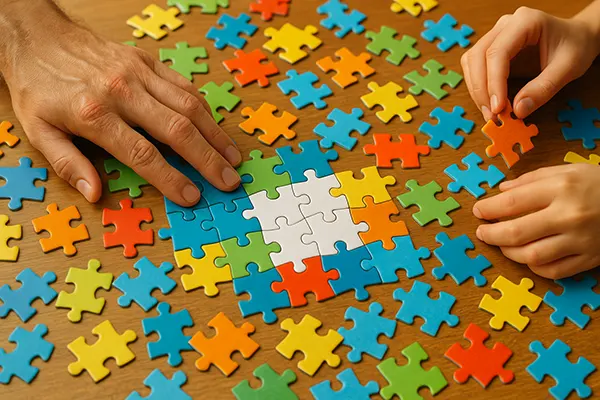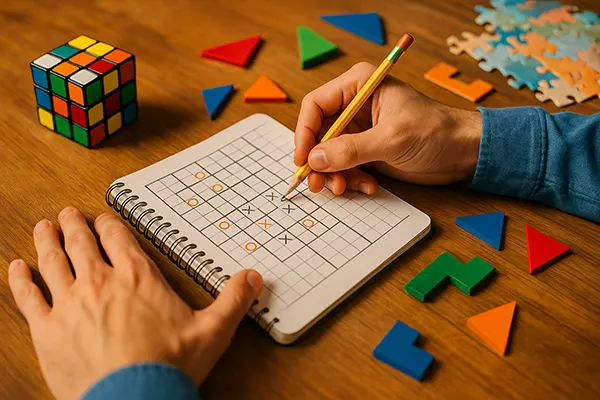
Puzzles continue to attract people of all ages, offering intellectual engagement, emotional satisfaction and a unique way to observe how the human mind deals with complexity. Their appeal remains strong in 2025, supported by research in psychology, neuroscience and education. As daily life becomes busy and technology evolves, puzzles provide a stable and meaningful activity that encourages reflection, cognitive discipline and structured thinking.
Why Puzzles Appeal to Human Curiosity
The appeal of puzzles is closely connected with innate curiosity. Humans naturally seek patterns, order and meaning, and puzzles give a clear environment where such instincts can be expressed. They offer a controlled space in which every clue, piece or number has its role, allowing the mind to engage in focused reasoning. This structured search for clarity stimulates cognitive reward mechanisms and creates a sense of intellectual accomplishment.
Another reason for their popularity is the balance of challenge and attainability. A well-designed puzzle is neither overly simple nor impossibly complex; it encourages persistence without causing frustration. Behavioural studies in 2024–2025 show that people remain most engaged when tasks provide moderate complexity, allowing steady progress while still requiring thoughtful analysis. The moment a solution presents itself feels earned, not accidental, which increases satisfaction.
Puzzles also foster a rare form of concentration that is increasingly valued. With constant digital interruptions, many individuals find puzzles to be one of the few activities that promote continuous attention. Whether solving a logic grid, a cross-number puzzle or a jigsaw, the mind shifts into a rhythm where focus replaces distraction. This immersion encourages mental stability and strengthens the ability to stay attentive during other daily activities.
The Psychological Rewards of Solving Tasks
Solving puzzles triggers a dopamine response associated with successful problem-solving. This chemical reaction reinforces motivation and supports the desire to complete similar tasks. The reward is not merely emotional; studies from cognitive science labs across the UK confirm that structured tasks provide measurable boosts to working memory and reasoning abilities. Such benefits accumulate over time, which is why puzzles are often recommended by educators and therapists.
Puzzles also encourage resilience. Each obstacle presents an opportunity to attempt a new approach, revise assumptions or explore alternative strategies. This repeated practice of trial and improvement supports a growth mindset, a concept widely discussed in modern educational theory. Experiencing small progress builds confidence, while consistent effort teaches patience and analytical flexibility.
The process of solving tasks can additionally help with stress regulation. Many people use puzzles as a mental break from daily demands, appreciating the calm structure they provide. The predictable nature of puzzles contrasts with unpredictable life events, creating a sense of stability. This grounding effect is particularly important in 2025, as mental wellness practices increasingly highlight the value of mindful logic-based activities.
Puzzles as Tools for Cognitive Development
Across numerous academic fields, puzzles are recognised as effective tools for cognitive strengthening. They stimulate spatial reasoning, deductive logic, pattern detection and linguistic processing, depending on their type. Because they are flexible and adaptive, puzzles can be adjusted for children, adults or older individuals seeking intellectual maintenance. International research highlights their role in long-term brain health, including reducing the risk of certain age-related cognitive declines.
Digital puzzle formats have expanded these benefits by offering personalised difficulty levels. Modern puzzle applications analyse performance and adjust future tasks accordingly, ensuring that individuals continue to face challenges appropriate to their skill level. This adaptive approach increases long-term engagement while providing tailored cognitive training. Many educational platforms in 2025 rely on puzzles as part of their core curriculum due to their measurable impact on learning outcomes.
Puzzles also promote collaboration when solved in groups. Shared problem-solving strengthens communication skills, encourages different perspectives and demonstrates how individuals combine strengths to reach solutions. Whether used in classrooms, team-building workshops or family settings, puzzles foster cooperation and show that analytical thinking can be a collective effort.
How Puzzles Support Lifelong Learning
Lifelong learning is a key concept in modern society, and puzzles naturally support this goal. They encourage continuous intellectual activity by presenting tasks that evolve with the solver’s experience. Individuals can gradually progress from simple crosswords to complex logic puzzles or shift from standard jigsaws to intricate strategy-based formats. This progression reinforces mental adaptability and curiosity throughout one’s life.
Puzzles also encourage learners to approach knowledge with precision. Each clue must be interpreted correctly, each assumption verified and each step followed with intention. This kind of structured engagement reflects the analytical processes used in professional and academic environments. It refines reasoning skills that are relevant for careers in science, engineering, education, design and numerous other fields.
Beyond formal learning, puzzles strengthen reflective thinking. By slowing down and focusing on details, individuals learn to observe patterns more carefully and draw connections between separate pieces of information. This attentiveness translates into improved decision-making, both in personal and professional contexts. As problem-solving skills grow, everyday tasks often become more manageable.

The Role of Puzzles in 2025 Lifestyle Trends
The year 2025 marks a strong rise in interest for structured recreational activities. Puzzles have become part of daily routines for many people seeking balance between technology use and mental clarity. Whether solved on paper, in board formats or through digital apps, puzzles provide a straightforward way to practise cognitive skills without time pressure or competitive elements. They support routines that value stability, focus and emotional wellbeing.
Online communities dedicated to puzzles have expanded significantly. Enthusiasts exchange solutions, discuss techniques and organise challenges that highlight creativity and innovation in puzzle design. This sense of community demonstrates that puzzles function not only as individual tasks but also as cultural activities that connect people across backgrounds. Many of these groups advocate for inclusive puzzle design that accommodates various ages and abilities.
Professional fields also incorporate puzzles into practical applications. Recruiters use logic tasks to evaluate reasoning abilities; educators rely on them to enhance classroom engagement; and cognitive specialists integrate puzzles into rehabilitation programmes. Their versatility makes them a dependable tool in environments where critical thinking and sustained attention are essential.
Why Puzzles Remain Relevant in a Fast-Paced World
Despite rapid technological development, puzzles remain relevant because they rely on foundational mental processes that technology cannot replace. They highlight human reasoning rather than automated solutions. While artificial intelligence can generate puzzles or evaluate their difficulty, the act of solving remains a distinctly human experience based on intuition, pattern recognition and persistence.
Another reason for their continued relevance is their accessibility. Puzzles require minimal resources and can be enjoyed in short sessions or over extended periods. They fit naturally into modern lifestyles where flexible engagement is important. Whether during a commute, lunch break or quiet evening, puzzles offer a steady form of intellectual challenge.
Finally, puzzles provide a meaningful break from overstimulation. Modern individuals often deal with large volumes of information, and puzzles offer a way to organise thoughts within a defined framework. This structured clarity is one of the primary reasons why their popularity continues to rise, reflecting the human need for order, strategy and mental discipline.